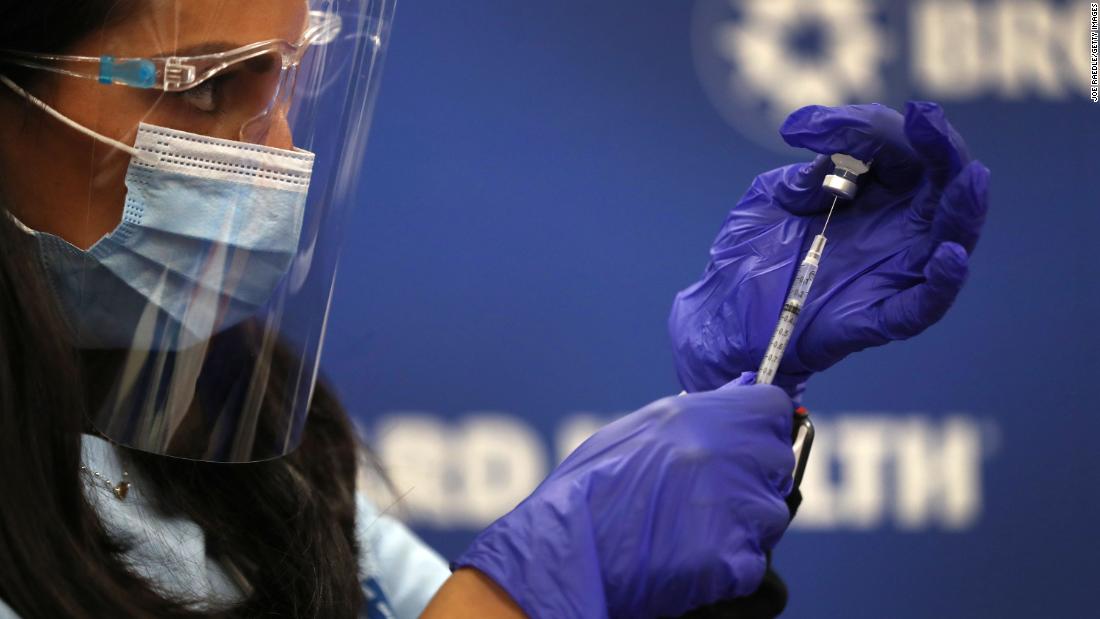How does the covid-19 vaccine get to your arm?
1:18
(CNN) -
Vaccine advisers from the U.S. Centers for Disease Control and Prevention (CDC) voted 13 to 1 this Sunday to recommend that both seniors, 75 and older, or more, as "essential front-line workers," including first responders, are the next to receive the COVID-19 vaccines.
That would put these people in "Phase 1b" of vaccine allocation nationwide.
The committee's vote also included prioritizing adults ages 65 to 75, people ages 16 to 64 with high-risk medical conditions, and "other essential workers" in the "Phase 1c" assignment.
"They really serve to address the current lack of vaccine supply and address those at highest risk of disease," said Dr. José Romero, chair of the Advisory Committee on Immunization Practices and secretary of the Arkansas Department of Health, on the recommendations.
US Army Scientists Test New Coronavirus Variant for Vaccine Resistance
advertising
The Advisory Committee on Immunization Practices met Sunday to discuss Phases 1b and 1c of vaccine distribution.
At an earlier meeting earlier this month, the group voted on Phase 1a, which recommended administering the first round of vaccines to healthcare workers and residents of long-term care facilities.
There are two covid-19 vaccines - Pfizer / BioNTech and Moderna - currently licensed for emergency use in the United States.
Who is an essential worker?
A working group within the advisory committee defined essential frontline workers as "workers who are in sectors essential to the functioning of society and have a substantially increased risk of exposure" to the coronavirus that causes covid-19.
Essential frontline workers in Phase 1b include first responders, people in the education sector, those who work in food and agriculture, those in manufacturing, prison workers, U.S. Postal Service workers, transit workers and supermarket workers.
There are an estimated 30 million essential frontline workers in the United States.
The category of other essential workers in Phase 1c includes people from transportation and logistics, food service, construction, shelter and housing, finance, information and communications technology, the energy sector, the media, the legal sector, the public safety and the water and wastewater industries.
There are an estimated 57 million of these essential workers in the United States.
No evidence that the new coronavirus variant is more deadly or resistant to the vaccine, says public health expert
What to expect from vaccines and the covid-19 variant?
0:52
The "toughest" vote
"This is without a doubt the toughest vote I've had in my six and a half years on the committee," Romero said.
“I am sure that we have arrived at this by examining the data in depth, and that what we are providing, as said before, the final decision will be at the local level.
But what we are providing to governors and officials is a framework that is supported by evidence, "said Romero.
Romero voted "yes" to the proposed recommendations for Phase 1b and 1c.
Committee member Dr. Peter Szilagyi, who also voted 'yes', agreed that the decision was difficult.
"I really wish everyone could get the vaccine today, and I know that high-risk people are not included in Phase 1b," said Szilagyi, who works in the Department of Pediatrics at the University of California, Los Angeles.
"But for several months, as the vaccine supply increases, all Americans will have access to these safe and effective vaccines."
The only "no" vote came from Dr. Henry Bernstein, who is Professor of Pediatrics at Hofstra's Zucker School of Medicine.
Bernstein explained that he voted no because he felt the science on covid-19 morbidity and mortality is similar between the 65-74 age group and the 75 and older age group.
"So including the 65-74 age group in Phase 1b made more sense to me," Bernstein said.
The covid-19 vaccine can't be safe and other myths
When would you start distribution of Moderna's vaccine?
2:38
The need for financing
In their vote, the majority of the committee members also asked the Government to fully fund the vaccination programs of the state and local Health Departments.
"The fact that state and local Health Departments have not been funded for the vaccination program, especially in the context of the billions of dollars that funded the extremely successful program to develop vaccines is truly appalling," said Dr. Beth Bell, who voted "yes" to the proposal.
"I am just one person, but I would like to say, again, that I hope the government will address this discrepancy, without which I think it will be very difficult for us to be successful," said Bell, clinical professor in the University's Department of Global Health. from Washington.
The advisory committee recommendations for Phase 1b and 1c are then passed to CDC for final acceptance.
Coronavirus Vaccine

